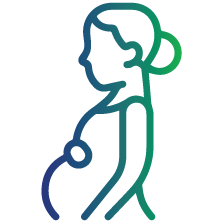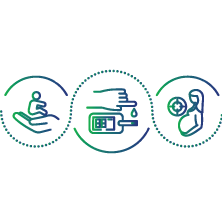
Glucose Tolerance Test (GTT) 75 gm
Glucose Tolerance Test (GTT) 75 gm
The glucose tolerance test determines the amount of glucose in your blood. The glucose tolerance test can help you understand how efficiently your body transports sugars from food into blood and tissues such as muscle and fat. This test is advised for pregnant women as a part of pregnancy screening test to know if the mother is at risk of developing gestational diabetes.
Other names of glucose tolerance test are oral glucose tolerance test, OGTT, glucose challenge test, gestational diabetes – glucose screening, glucose challenge test -pregnancy
Symptoms of Gestational Diabetes

Feeling thirsty very often

Feeling hungry often

Fatigue

Urinating a lot

Losing weight without efforts

Numbing or tingling of hands and feet

Having infections more than usual
Who should get tested?
The glucose tolerance test is generally recommended in pregnant women who are at risk of gestational diabetes or have had gestational diabetes during previous deliveries.

Pregnancy over the age of 40

Previous history of gestational diabetes

Family history of diabetes

History of polycystic ovarian syndrome
Test preparation
Before taking the test, it is recommended that you fast for at least 8 to 10 hours.
The healthcare professional will draw a few milliliters of blood while you are in a fasting state, and then you will be given a 75-gm glucose solution to drink, with blood sugar levels measured one and two hours after having the drink
Interpretation of the Test Results
Interpretation of test results:
|
Name of the test |
Normal Values (mg/dL) |
||
|
Normal |
1-hour post-to-syrup consumption |
2 hours post-to-syrup consumption |
|
|
Oral Glucose Tolerance Test |
<95 |
<180 |
<150 |
Deviations from the normal ranges:
If your test results show higher than normal glucose levels, this indicates you most probably may have gestational diabetes or are at risk of developing it. Furthermore, elevated glucose levels may indicate:
• Hyperthyroidism
• Pancreas disorders
• Stress following surgery, a life-threatening illness, or trauma
If you have gestational diabetes, your blood glucose levels may be lower than normal for a variety of reasons, including:
• Eating insufficiently, particularly after taking diabetes medication
• Exercising more frequently than usual
Low blood sugar levels without diabetes may indicate:
• Liver disease
• Kidney disease
• A hypoactive thyroid, pituitary, or adrenal gland (hypothyroidism)
• Addiction to alcohol (AUD- Alcohol used disorder)
If your glucose levels are abnormal, it is possible that you have a medical condition that requires treatment. Both stress and certain drugs might have an effect on glucose levels. Speak with your doctor to find out what your test findings signify
FAQs
What is the turnaround time (TAT) for glucose tolerance test?
The test results of the glucose tolerance test are generally available within a day of sample collection. However, it could also take a little longer at times
Are there any risks associated with glucose tolerance test?
No, there are no potential risks associated with glucose tolerance test. However, all blood tests come with negligible risks such as feeling a slight sting or a bruise at the site of needle insertion. It usually resolves within a few minutes to a couple of hours. Rarely, the site can become infected
Can I take a glucose tolerance test if I had a meal 4 hours before the test?
No. Your body will take at least 10 hours to digest all of the meals in your system, allowing you to establish your genuine fasting blood sugar level more accurately. Since carbohydrates, proteins, and fats digest at various rates, a larger meal will take longer to digest. Therefore, to obtain accurate results from the test one must take the glucose tolerance test after a fasting state of about 8 – 10 hours
What medications can affect the test results of the glucose tolerance test?
Certain drugs such as salicylates, diuretics, anticonvulsants, etc. may cause a decrease in insulin secretion. It is advised to stop taking these medications 3 – 4 days before taking the test
Does gestational diabetes harm the developing baby in the mother?
Yes, gestational diabetes raises the chance of the infant being overweight as a child and developing type 2 diabetes later in life

